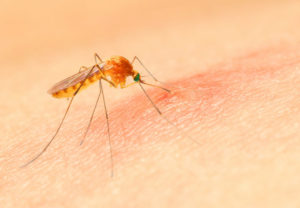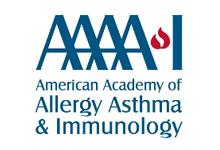 Mosquitoes are insects that are found all over the world. There are about 200 different species in the United States, living in specific habitats, exhibiting unique behaviors and biting different animals. Only female mosquitos bite animals and humans. Her mouthparts are designed so that the tip of her mouth pierces the skin into a small blood vessel. When this occurs, she injects her saliva into the opening and then sucks out blood. While mosquitoes can spread diseases to humans, such as, Malaria, West Nile encephalitis, Dengue fever and Zika virus, most mosquitos are harmless. People who have never been bitten before (primarily young children) may not react at all. However, those who have had a mosquito bite may develop allergy to the protein found in the mosquito saliva. There are three types of allergic reactions that can occur to mosquito bites: local skin reactions, large local skin reactions and systemic reactions.
Mosquitoes are insects that are found all over the world. There are about 200 different species in the United States, living in specific habitats, exhibiting unique behaviors and biting different animals. Only female mosquitos bite animals and humans. Her mouthparts are designed so that the tip of her mouth pierces the skin into a small blood vessel. When this occurs, she injects her saliva into the opening and then sucks out blood. While mosquitoes can spread diseases to humans, such as, Malaria, West Nile encephalitis, Dengue fever and Zika virus, most mosquitos are harmless. People who have never been bitten before (primarily young children) may not react at all. However, those who have had a mosquito bite may develop allergy to the protein found in the mosquito saliva. There are three types of allergic reactions that can occur to mosquito bites: local skin reactions, large local skin reactions and systemic reactions.
Local reactions
This usually consists of immediate swelling with surrounding redness that peaks at about 20 minutes. A delayed itchy firm bump usually develops at 24 to 36 hours. These symptoms resolve over 7 to 10 days.
Large local reactions
Also known as, Skeeter Syndrome, it is characterized by itchy or even painful area of redness, heat, swelling and/or firmness. This develops within hours of the bite, progresses over 8 to 12 hours and resolves within 3 to 10 days. It can involve the face, or an entire extremity, especially in an infant or child. Occasionally, this can be accompanied by low grade fever and fatigue.
Systemic allergic reactions
These types of reactions include acute generalized hives, and rarely, asthma symptoms, lymph node enlargement, fever, and necrotic skin reactions at mosquito bite sites. Anaphylaxis is exceedingly rare but can occur and it is a potentially life-threatening condition characterized by throat swelling, generalized hives, faintness or wheezing.
How do I know if I am allergic to mosquitos?
If you experience any of the symptoms listed above, you could be allergic. Diagnosis involves a thorough history, physical examination and allergy skin prick testing. Sometimes blood work may be ordered to check for sensitivity.
Who’s at risk of getting bitten?
Mosquitoes are generally attracted to certain scents, exhaled carbon dioxide, and chemicals present in a person’s sweat. Some studies have shown that pregnant women are more likely to get bitten than one who is not pregnant. Those with type O blood type may be at higher risk of a bite.
Prevention is key!
They are several steps you can take to protect yourself from mosquito bites. Mosquitoes are most active in the summer and thrive in hot and humid climates. Dusk and dawn are the most popular time of day for mosquitos. It is best to be prepared and avoid being outdoors during those times. Mosquitoes love water so it’s a good idea to inspect your house for standing water. Wearing light colored clothing, socks and/or pants can be helpful. Outdoor citronella scented candles can help as well.
Insect repellents that contain 6 to 25% DEET should provide two to six hours of protection. If there is eczema, it is recommended to apply insect repellent to the clothing rather than directly on the skin.
Treatment
For mild reactions, cold compresses can be applied to the bite. Over-the-counter topical lotions, such as calamine, can help with mild itching. Alternatively, a paste made from baking soda and water, applied to the site, can be effective.
For more moderate symptoms, oral antihistamines and topical steroids can be used to relieve the itching and swelling.
For any severe symptoms or if a reaction is progressively getting worse, it is best to seek medical care. Epinephrine may be required if you are experiencing anaphylaxis.
What’s the next step?
At North Texas Allergy and Asthma Center, our board-certified allergists are specialized and can diagnose and treat underlying allergy in both children and adults. If you have had reactions to mosquito bites in the past, you could be allergic! Come see us for allergy testing. We can create a treatment plan for you!
SHIKHA MANE, MD
Board Certified Allergist







